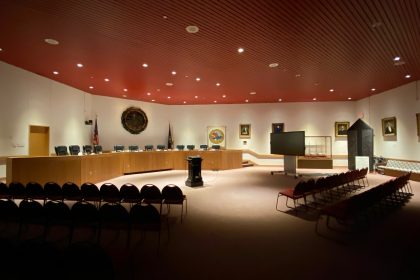By: Buck Fuller
On Monday and Tuesday, February 12th and 13th, the City held its “quasi-trial” of Mr. James Hewitt, alleging that, as a member of the City’s Planning Board, he violated the juror standard, conducted malfeasance, and sent emails in violation of the New Hampshire Right-to-Know (RTK) Law. For all these reasons, the City sought to remove Mr. Hewitt from the Planning Board.
We provide links to the first and second parts of the two-part City Council hearings on Jim Hewitt at the end of this article.
All Present
Mr. Hewitt was capably defended by Attorney Jeremy Eggleton of Orr and Reno in Concord, NH.
The City was represented by its staff of attorneys, led by City Attorney Susan Morrell. In all, the City brought two senior attorneys and an aide to the hearing table. In addition, the City’s counsel was represented by Attorney Peter Loughlin, retained by the City for his expertise in municipal law.
All nine City Council members were present, but Councilor Josh Denton had recused himself. That left 8 Councilors to hear and vote on Jim Hewitt’s fate.
Highlights
This was an eleven-hour event. But there were many dramatic moments.
Sullivan, the “Nice Guy”
The City’s first witness was former City Attorney Robert Sullivan. It was clear to some observers that City Hall was not the first establishment he visited this evening.
Attorney Sullivan presented himself “as a nice guy.” We know what a nice guy he can be. He tries to be friendly. At one point, he sermonized on how important it was to tell everyone at City Hall what a good job they were doing in their daily work. But there is another side of Sullivan. If he doesn’t get the behavior he wants, he can become very punitive and angry.
So here he presented his nice side, describing how he coached defendant James Hewitt time and again so Hewitt would have a successful career as a Planning Board (PB) member. He started this mentoring even before Hewitt joined the PB, cautioning Hewitt to not express his opinion to friends as he did in a personal email regarding the North Mill Pond development. This was a “teachable moment” according to Sullivan. Hewitt was warned: he “had to be careful” to not violate his role as a judge in the PB quasi-judicial hearings.
Beware
Fair enough. But Sullivan’s view of a judge’s role is not appropriate for a PB member. Per Sullivan, a judge mustn’t do personal investigation into matters. But the courts have permitted PB members to do site visits, bring in their own personal experience and training and seek pertinent public information to inform their votes. Courts have given PB members more latitude.
It seems that Sullivan wants to control PB members, especially those the City identifies as being too independent and too well-informed. Is it bias if a PB member uses judgment, experience and knowledge and votes against a development? When do citizens get protected from a City management that strives to please a developer?
Sullivan’s ultimate threat to a wayward citizen volunteer who doesn’t comply with his guidance, his instruction, his nuance or his “common sense” approach is to remove the volunteer from the Board. Can’t reliably control Hewitt and Hewitt’s diligence and passion for making correct decisions? Get rid of him.
Crayons, Anyone?
Attorney Eggleton, when cross-examining Sullivan, gives Sullivan a highlighter. “Please mark where in RSA 673:13, Removal of Members, is the juror standard cited for cause of removal?” Sullivan is unable to find any such citation. We add that the RTK violations are also not cited. There’s no basis for removing a Board member for violating the juror standard or the RTK laws.
Then Eggleton shows Sullivan RSA 673:14, the Disqualification of a Member. This is where the juror standard is cited. He asks Sullivan to use the marker to show where removal of a member is required for a violation of the juror standard? Sullivan can’t find it. It doesn’t appear.
It’s apparent that the City cannot legally remove a PB member for these alleged “crimes.”
Chellman: Bias Resides with the City Councilors, Not Hewitt
Attorney Morrell brought to the stand Chairman Rick Chellman of the Planning Board. At the end of Chellman’s testimony under Morrell, Eggleton cross-examined him.
Chellman reported that he and Mayor McEachern met with Hewitt late on January 11th to offer Hewitt his last chance to admit his guilt to the City’s charges before this hearing would be held. Chellman volunteered that he attended this meeting “just to listen.” At the meeting, according to Chellman, McEachern said Hewitt had crossed the line to commit malfeasance.
Attorney Eggleton quickly wheeled on McEachern, citing the Mayor’s obvious bias as demonstrated in his statement of Hewitt’s guilt. McEachern should recuse himself. McEachern knew he was caught and told Chellman that it was he, not McEachern, who made such statements. Chellman saw the trap he unwittingly created and agreed with McEachern, “That is exactly what was said.” Cleared of this instance of bias, McEachern said he did not need to recuse himself and that he was able to render unbiased judgment.
Later, Attorney Eggleton questioned Councilor Tabor regarding his demonstrable bias since he voted against Hewitt’s appointment to the Planning Board in December 2021. Tabor gave an agonized reply that he could give an unbiased judgment.
Attorney Eggleton drove home the point that under the juror standard both McEachern and Tabor had to look within themselves and make their decisions whether they would be unbiased, just as Hewitt would be expected to determine his ability to serve in an unbiased fashion. What was sauce for the goose should be sauce for the gander.
We wonder if either McEachern or Tabor could have “convicted” Hewitt of any of the alleged “crimes” given that they had possibly violated the juror standard for non-recusal. To do so would have almost guaranteed that Eggleton would appeal.
Hewitt’s Rebuttal: There Are No Crimes
Eggleton went through each of the City’s 6 exhibits, each one included to prove violations of the juror standard, RTK laws and malfeasance. One-by-one, Eggleton demonstrated that the alleged transgressions by Hewitt were in fact
- Making legitimate expressions of free speech,
- Seeking additional public environmental records be included,
- Seeking inclusion of public records from prior, 2019 applicant hearings,
- Inquiring as a private citizen about the status of Hewitt’s neighbor’s ADU project,
- Sending links to environmental studies regarding the Banfield Road site, and
- Raising the issue of an applicant incorporating parking that was actually on state land.
In fact, in Exhibit 4, Hewitt recused himself from his neighbor’s application when it was reheard by the PB. Unaware of this, Sullivan grudgingly said “he did the right thing.”
Alleged Right-to-Know Violations
Hewitt was also accused of violating RTK law. He sent emails to his fellow Board members and City Planning Department staff seeking additional information or expressing skepticism of projects. Not one of his emails earned a response from his email recipients. Not one of his emails required a decision to be made. He did not send this as private correspondence, but as public correspondence. His purpose was to make sure important information was brought forward for the Board to consider in a timely fashion.
Attorney Loughlin agreed with Eggleton that Hewitt’s emails in fact did not constitute violations of the NH RTK law precisely because no decisions were made, and the emails were all public. There were no “meetings” as defined by statute.
The City’s case against Hewitt continued to crumble.
Malfeasance
Eggleton, in his summary statement, said there was no malfeasance here. There were no criminal acts. No one, especially Hewitt, was lining his or her pockets. No one was taking advantage of their office for personal gain. Malfeasance is not described as “doing what he ought not to have done” when Hewitt had not actually violated the juror standard, the RTK laws or any of the normal definitions of malfeasance. Eggleton said that if City management could remove a member from a Board for these dubious claims, no one would reasonably consider serving on a Board.
The Bully Whimpered
As it was, Eggleton successfully argued that the City had no case and that the entire exercise was political in nature.
The City Council voted, after over 11 hours of proceedings: 7 to acquit, 1 to charge and 1 recused.
What a disgrace!
Attached Links, First and Second Sessions of the City Council Hewitt Hearings
Here’s the link to the 5-hour February 12th video:
First Session – Hewitt Hearing – February 12 2024
Here’s the link to the 6.25-hour February 13th video:











